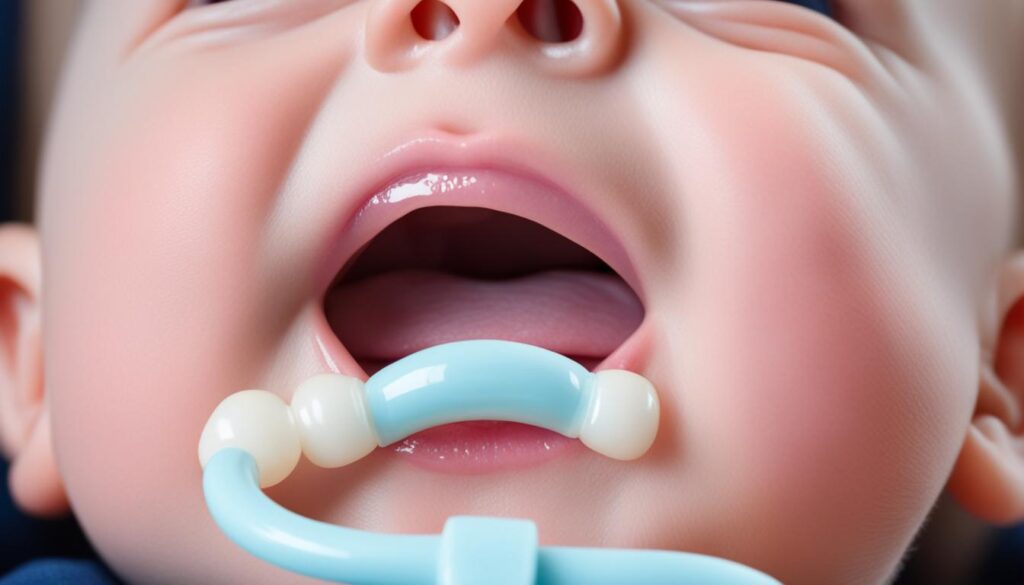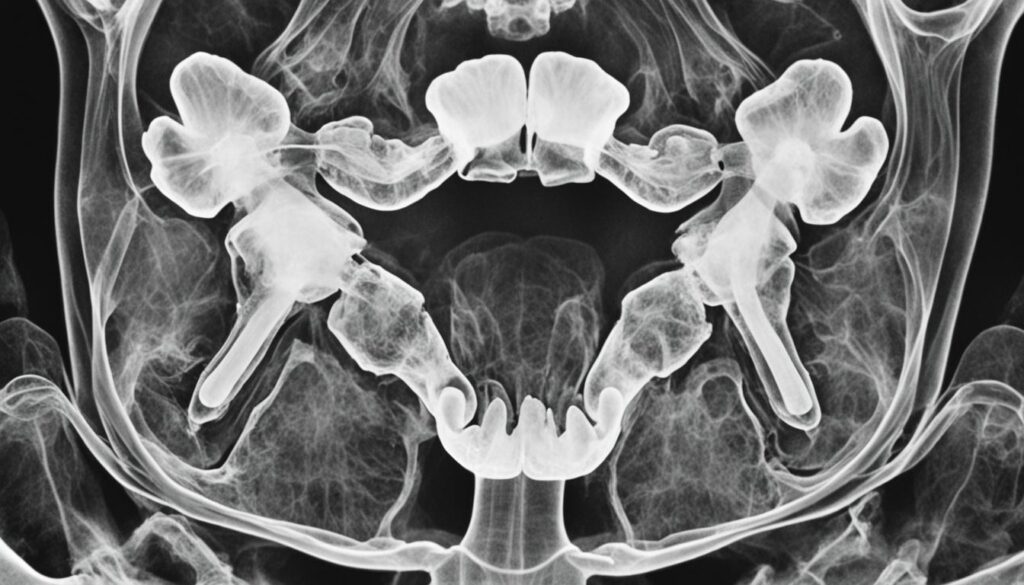As an Amazon Associate. I earn from qualifying purchases
As a parent, hearing your baby make strange sounds while bottle feeding can be worrying. The familiar clicking noise some babies make during feeding is quite common. It’s important to know why this happens to ease your worries. What exactly is this clicking, and why does it occur?
Key Takeaways
- Clicking during bottle feeding is a common occurrence in many babies.
- The clicking sound is caused by a loss of suction, which can be due to various factors, such as positioning, latch, or feeding difficulties.
- While occasional clicking may not always be a problem, consistent clicking should be evaluated by a healthcare provider.
- Understanding the potential causes of clicking, such as tongue tie, overactive milk flow, or oral muscle weakness, can help parents address the issue.
- Seeking professional guidance can help identify the underlying cause and provide appropriate solutions to improve the feeding experience for both baby and parent.
What is Clicking?
Parents may hear a distinct clicking sound when bottle feeding their baby. This noise, often like a “tsk tsk” or “tongue popping” sound, happens when the baby’s mouth loses suction. The clicking’s intensity and quality depend on where the tongue loses its grip on the bottle nipple.
Definition and Description of Clicking Sounds
The clicking sound comes from the baby’s tongue losing its seal on the bottle nipple. This can occur if the baby’s tongue is not in the right spot or if the latch is off. The sound is similar to an adult’s tongue pop but not as sharp. Sometimes, leaking milk from the baby’s mouth may happen too.
This clicking is a short, sharp sound that breaks the smooth sucking rhythm. It can mean the baby is having trouble keeping a good latch or has trouble with milk flow. Knowing about this clicking noise helps parents spot and fix feeding issues.
Clicking while bottle feeding is common and shows how the baby is feeding. Being aware of why this noise happens lets parents improve the feeding experience. This ensures their baby gets the nourishment they need.
Causes of Clicking During Feeding

Many factors can cause the clicking sounds some babies make while bottle feeding. Knowing why can help parents and caregivers fix the issue. This makes feeding more comfortable for their babies.
A big reason for the clicking is poor positioning and latch. If a baby doesn’t latch right on the bottle, air gets in. This makes the clicking sounds. Making sure the baby is positioned right and has a good seal on the bottle helps prevent this.
Another cause is a forceful letdown or overactive milk ejection reflex. This happens when there’s too much milk and it flows too fast for the baby. The baby clicks to try to control the flow.
- Feeling too full can also cause clicking, as the baby can’t latch well.
- Tongue tie, limited tongue movement, and weak tongue muscles make it hard to seal the bottle.
- Lip tie and weak muscles also affect how well the baby can latch and feed.
Other reasons include body tension, physical issues, and infections. These can make feeding hard and cause the clicking sounds.
Understanding these causes helps parents and caregivers fix the issue. This makes feeding more positive and comfortable for their babies.
Poor Positioning and Latch
Getting the bottle into a baby’s mouth the right way and keeping their body in the right position is key for bottle feeding. If a baby’s mouth doesn’t attach right or their body isn’t set up correctly, it can cause a clicking sound. This sound can make feeding hard.
Importance of Proper Latch and Position
A good latch means the baby can get milk from the bottle well. A comfy feeding position helps the baby suckle and swallow better. Getting the latch and position right cuts down on clicking sounds. It makes feeding easier and less stressful for the baby.
Techniques for Improving Latch and Position
- Support the baby’s head and neck in a neutral position, with the chin slightly tucked in.
- Ensure the baby’s mouth is wide open, with the lips flanged outward, when taking the bottle.
- Gently tilt the bottle slightly, keeping the nipple filled with milk to prevent air intake.
- Try different feeding positions, like cradling the baby or holding them upright, to find what’s most comfy.
- Adjust the bottle’s angle and placement to help the baby latch on deeply and comfortably.
Learning how to get the latch and position right can make bottle feeding better for babies. It helps stop the clicking sounds that can interrupt feeding.
Forceful Letdown or Overactive Milk Ejection Reflex

One common cause of the dreaded clicking sound during bottle feeding is a forceful letdown or overactive milk ejection reflex. Some mothers produce a lot of milk that flows very fast. This can overwhelm the baby and cause clicking noises.
When the milk flow is too strong, the baby may struggle to keep up. They might release their tongue suction to breathe. This sudden action is what makes the clicking sound that can upset both parents and baby.
Managing Forceful Letdowns and Oversupply
Fortunately, there are ways to manage forceful letdowns and oversupply to reduce clicking during bottle feeding:
- Try feeding in a more upright or laid-back position to slow the milk flow and let the baby control the feeding pace.
- Express a small amount of milk before feeding to lessen the initial force of the letdown.
- Make sure the baby is well-supported and their head is slightly elevated for a proper latch and swallowing rhythm.
- Consider using a slower-flow bottle nipple to control the milk delivery.
- Pump or hand express to relieve breast fullness and lower the chance of a forceful letdown.
By tackling the root causes of forceful letdowns and oversupply, parents can make bottle-feeding smoother and quieter for their babies.
Engorgement and Breast Fullness
One common cause of clicking noises in bottle-fed babies is breast engorgement or excessive breast fullness. This makes the skin tight and swollen. It becomes hard for the baby to latch onto the bottle right. This loss of suction leads to the clicking sound during feeding.
Being very full, especially in the early stages of breastfeeding or when milk supply is high, can cause this issue. The baby may find it hard to hold the bottle, leading to a poor latch and clicking noises.
| Cause | Impact | Solution |
|---|---|---|
| Breast engorgement and fullness | Difficult for baby to latch onto the bottle, leading to loss of suction and clicking noises | Manage breast fullness through techniques like breast massages, expressing some milk before feeding, and wearing supportive nursing bras |
Fortunately, fixing breast engorgement and fullness can stop the clicking noises during bottle feeding. Techniques like breast massage, expressing a bit of milk before feeding, and wearing a supportive nursing bra can help. These methods reduce swelling and tension in the breasts. This makes it easier for the baby to latch and feed without the clicking sounds.
“Addressing breast fullness and engorgement can make a significant difference in the bottle-feeding experience for both the baby and the parent.”
Tongue Tie and Limited Tongue Mobility
Persistent clicking noises during bottle feeding can often be traced back to poor tongue function. This is usually linked to a condition called tongue tie or ankyloglossia. Tongue tie is a birth defect where the skin connecting the tongue to the mouth is too short. This restricts how far the tongue can move.
Signs and Symptoms of Tongue Tie
Babies with tongue tie may show signs like trouble sticking out their tongue, a tongue that looks heart-shaped, and trouble moving the tongue side to side. These issues can make bottle feeding hard. They can cause the baby to make clicking noises while feeding.
Importance of Tongue Mobility for Feeding
The tongue is key to successful bottle feeding. It helps create a good seal on the bottle, draw milk in, and swallow it. If the tongue can’t move well because of a tongue tie, feeding can be tough. This can lead to the clicking sounds and other problems during feeding.
| Signs of Tongue Tie in Infants | Impact on Bottle Feeding |
|---|---|
|
|
Understanding tongue tie and its effects on feeding helps parents and caregivers. They can tackle the root cause of the clicking noises. This can make feeding better for their babies.
Weak Tongue Muscles
Weak tongue muscles can also cause the clicking sound during bottle feeding, besides tongue tie. Even if a baby’s tongue moves well, weak muscles make it hard to seal the bottle properly. This leads to the clicking noise.
Exercises to Strengthen Tongue Muscles
There are exercises to help strengthen a baby’s tongue muscles. These can make bottle feeding better. Doing these exercises daily can help stop the clicking sound. It also helps your baby feed well and efficiently.
- Tongue Pushups: Gently press down on your baby’s tongue with a clean finger, then have them push the tongue back up against your finger. Repeat this several times, encouraging their tongue strength.
- Tongue Twisters: Use your finger to guide your baby’s tongue in different directions, such as up, down, left, and right. This helps to improve overall tongue mobility and muscle control.
- Lip and Cheek Exercises: Gently massage your baby’s lips and cheeks, encouraging them to use these muscles to create a stronger seal around the bottle nipple.
Doing these exercises often can help make the weak tongue muscles causing clicking in bottle-fed babies stronger. It also helps your baby how to strengthen baby’s tongue muscles during feeding. Adding tongue exercises for bottle-fed infants to your routine can greatly improve their feeding.
Lip Tie and Weak Oral Muscles

Have you ever noticed your baby making clicking noises while feeding from a bottle? This might seem worrying, but it could be related to how your baby’s mouth works. The link between lip tie and clicking noises in bottle-fed babies is key to understanding.
One main reason for weak oral muscles causing clicking during bottle feeding is the tongue’s limited movement. The lips and muscles around them help the tongue suck and swallow well. If these muscles are weak, the tongue can’t move right, causing the clicking sound.
Knowing how oral muscle function affects bottle feeding is vital. Lip tie, where the skin between the lip and gum is too tight, can make these muscles weak. This can lead to the clicking noises and other feeding problems.
“Proper lip function is essential for effective bottle feeding. Weakness or limitations in the lips and surrounding muscles can hinder the tongue’s ability to work effectively, leading to the clicking sounds often observed in bottle-fed babies.”
Working with a healthcare expert, like a lactation consultant or speech therapist, is crucial. They can check your baby’s mouth and suggest ways to improve feeding. This might mean exercises to strengthen the muscles, fixing any lip or tongue tie, and better bottle feeding positions.
Understanding how lip tie and weak muscles cause the clicking sounds helps you help your baby. Taking steps to fix these issues can make feeding smoother and support your baby’s growth.
Body Tension and Physical Limitations
Body tension and physical limits can make bottle-feeding hard for babies, causing clicking sounds. Muscle weakness or oral muscle issues can affect tongue function. Similarly, physical tension or restrictions in the baby’s body can make it hard to latch onto the bottle and keep suction, leading to clicks.
Torticollis, a muscle tightness or shortening in the neck, is a common issue. It limits the baby’s motion, making it hard to position their head and mouth on the bottle. This disrupts the milk flow, causing clicks.
Working with your pediatrician or a lactation consultant is key. They can suggest techniques and exercises to ease body tension and boost the baby’s mobility. By tackling these physical issues, you can make bottle-feeding more comfortable and efficient, reducing clicks.
“Addressing physical factors, such as body tension and limitations, can be a game-changer in resolving clicking issues during bottle-feeding.”
Every baby is different, so a custom approach is often needed to tackle their physical challenges. With patience, effort, and the right support, you can help your baby overcome these hurdles and enjoy smooth bottle-feeding.
Hard Palate Abnormalities

Hard palate problems can cause clicking sounds during bottle feeding. The hard palate is the bony roof of the mouth. Issues like cleft palates or problems with its development can affect how the bottle fits. This can lead to a loss of suction and the clicking sounds.
It’s important to spot and fix hard palate issues in bottle-fed babies. These problems can change how they eat and affect their growth and health. Knowing how palate issues cause clicking noises helps parents and doctors make feeding better for babies.
Common Hard Palate Abnormalities
- Cleft palate: A congenital defect where the palate fails to fuse properly, creating an opening in the roof of the mouth.
- Palatal groove: A deep indentation or groove in the hard palate that can impact the seal and suction during bottle feeding.
- Palatal torus: A bony protrusion or ridge on the hard palate that can interfere with the bottle teat’s positioning and movement.
| Abnormality | Description | Impact on Bottle Feeding |
|---|---|---|
| Cleft Palate | A congenital defect where the palate fails to fuse properly, creating an opening in the roof of the mouth. | The opening can cause a loss of suction and lead to clicking sounds during bottle feeding, as well as difficulty maintaining a proper latch. |
| Palatal Groove | A deep indentation or groove in the hard palate. | The groove can disrupt the seal and suction between the bottle teat and the palate, resulting in clicking noises. |
| Palatal Torus | A bony protrusion or ridge on the hard palate. | The torus can interfere with the bottle teat’s positioning and movement, leading to a poor latch and clicking sounds. |
Knowing about hard palate problems and their effects on bottle feeding helps parents and doctors. They can work together to fix these issues. This makes feeding easier and better for the baby.
“Early identification and management of hard palate abnormalities can significantly improve the feeding experience for both the infant and the caregiver.”
Why Does My Baby Click When Bottle Feeding
There are many reasons why your baby might click during bottle feeding. These sounds can come from poor feeding positions, issues with latching, or even tongue tie or palate problems.
One common reason is poor positioning or a shallow latch. This can cause air to get into the mouth, making those clicking sounds. Changing how you feed and position your baby can fix this.
Another reason is a forceful letdown or too much milk. This makes it hard for your baby to handle the milk flow. Using a slower nipple or expressing some milk first can help.
- Tongue tie or limited tongue mobility can make it hard for your baby to latch and handle the bottle nipple, leading to clicking.
- Weak tongue muscles or lip tie can also cause clicking during bottle feeding.
- Tension in the body or physical issues, like a high palate or submucosal cleft, can make feeding uncomfortable.
Clicking can sometimes mean there’s an underlying issue, like an ear infection or thrush, that’s making feeding uncomfortable. Fixing the main problem can make feeding better for your baby.
Knowing why your baby clicks during feeding is the first step to solving it. By finding and fixing the cause, you can make feeding time easier and more enjoyable for your baby.
Ear Infections and Thrush
Ear infections and thrush can cause clicking noises during bottle feeding. These issues change how a baby eats, leading to temporary clicking sounds. Once these problems are fixed, the clicking should stop.
Temporary Clicking Due to Discomfort
Ear infections can make a baby feel uncomfortable and in pain. This can affect how they latch and suck during bottle feeding. It might cause clicking sounds. Thrush, a fungal infection in the mouth, also makes sucking and swallowing hard, leading to clicks.
To fix these issues, treat any ear infections or thrush. This will help ease the discomfort and make feeding normal again. After treatment, the clicking should go away. It’s best to see a healthcare provider for the right diagnosis and treatment.
| Condition | Symptoms | Impact on Bottle Feeding |
|---|---|---|
| Ear Infections |
|
|
| Thrush |
|
|
Understanding how ear infections, thrush, and clicking during bottle feeding are linked helps parents. They can then address the root cause. This ensures their baby stays comfortable and healthy.
Aerophagia and Infant Reflux
One key factor that can cause clicking noises in bottle-fed babies is the link between aerophagia and infant reflux. Aerophagia happens when a baby takes in air during feeding. This air can lead to issues with reflux.
The Connection Between Clicking and Reflux
Aerophagia is often linked to the clicking sounds in some bottle-fed infants. This air intake can cause gas, burping, and reflux. Reflux is when stomach contents flow back into the esophagus.
Clicking during bottle feeding might mean the baby is having trouble making a good seal on the nipple. This can lead to swallowing air. This air can cause reflux symptoms as it moves through the digestive system.
Fixing the clicking can help reduce aerophagia and maybe improve reflux. Making sure the baby feeds properly and addressing any issues can help. This can lessen the clicking and reflux symptoms.
| Factors Contributing to Clicking and Reflux | Potential Solutions |
|---|---|
| Aerophagia (air intake during feeding) | Improving latch and swallowing technique |
| Tongue tie or limited tongue mobility | Assessing for tongue tie and providing treatment if needed |
| Weak oral muscles or abnormalities | Exercises to strengthen tongue and oral muscles |
| Forceful letdown or oversupply of breastmilk | Managing forceful letdowns and oversupply |
Understanding the link between aerophagia and clicking noises in bottle-fed babies helps parents and healthcare providers. They can address the causes and improve feeding and digestion for the baby.
Conclusion
Bottle-fed babies may hear clicking sounds due to various reasons, like poor positioning or structural issues. Finding and fixing the main problem helps parents and babies have a better feeding time.
This article highlights common causes of clicking, such as forceful milk flow, tongue tie, weak mouth muscles, and reflux. Parents should watch how their baby feeds and get help from a doctor or lactation expert if the clicking doesn’t go away or if feeding gets harder.
Every baby is different, so fixing the clicking might need different steps. By working with experts and being patient, parents can help their baby feed better and prevent future problems. With the right help, the clicking can be fixed, making feeding time special for both parent and child.


